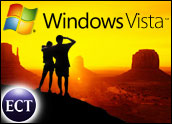
Microsoft on Thursday launched its Windows Vista operating system for businesses, along with Office 2007 suite and Exchange Server 2007.
Microsoft made the introduction at the Nasdaq stock exchange in New York City. The software giant is also celebrating 20 years as a publicly traded company.
After years of development and several stalls, questions remain whether the market will be quick to adopt the new software, or will uptake be as slow as the development of the operating system itself.
A Daunting Task
Microsoft faces the daunting task of overcoming consumer and corporate apathy to hit their projections of 90 million copies of Vista in the coming year, according to Enderle Group Principal Analyst Rob Enderle.
“Fortunately, or unfortunately if you think about it, they have a huge ace in that the security industry is now openly admitting they are losing the security battle and it’s a near rout,” Enderle noted.
“The only real fix may be Vista, which is vastly cheaper to deploy then any competing platforms, and is a game changer when it comes to security coming much closer to traditional workstation platforms in terms of natural protections,” he added.
Raising the Bar
Microsoft has touted Windows Vista’s enhanced security and manageability features, according to Sanjay Parthasarathy, corporate vice president of Microsoft’s Developer & Platform Evangelism Group.
The prospect of safer computing may entice users to move to the new OS. First, there’s the increased media focus on security breaches; and second, the small to mid-size business market and the consumer market remain largely unprotected against security threats, according to Enderle.
Although Microsoft cannot claim Vista victory just yet, all this creates the potential for a big deal changer, Enderle stressed.
Office as a Platform
Microsoft is also pushing Office as a platform. Office has long been considered a platform by developers and Office users, Parthasarathy noted, particularly when you look at the thousands of add-ins and customizations done for the Office client over the years.
In the last two years, however, Microsoft has embraced the notion of Office as a platform for developers who want to use Office as a front end to mission critical business systems.
“Support for XML, introduced in Office 2003, enriched developer tools via Visual Studio Tools for Office, and opportunities for developers to share ideas and hear from technical experts at events such as the Office Developer and SharePoint conferences have been instrumental in realizing this vision,” Parthasarathy explained.
The Web 2.0 Threat
Microsoft has at least one more advantage relative to Office 2007. Buyers generally move to a new version of Office when they move to a new OS and the reviews on Office 2007 have been very good so far.
That suggests there is little likelihood that folks will move to Vista and not upgrade Office. However, Microsoft still has no long-term guarantee as the software industry evolves.
“There is stronger competition for this Office business but much of the Web 2.0 stuff is simply not mature enough yet. Next cycle, that could clearly change, however,” Enderle warned.




















































